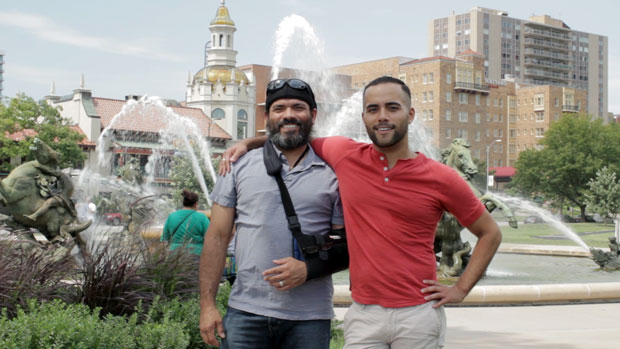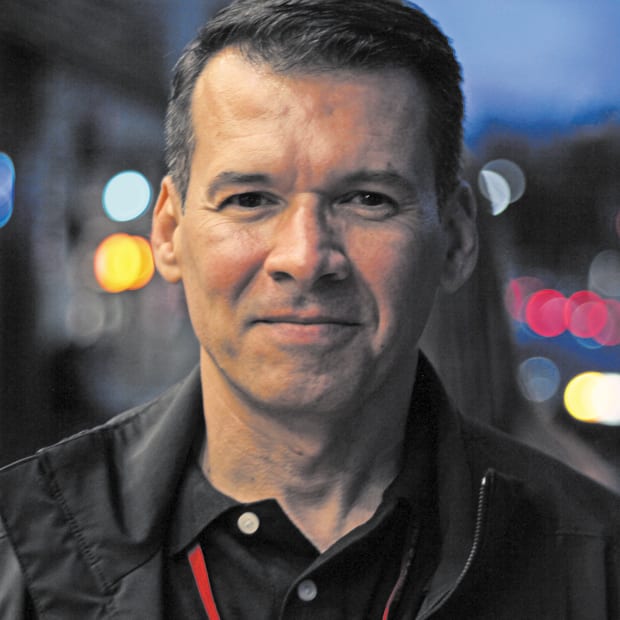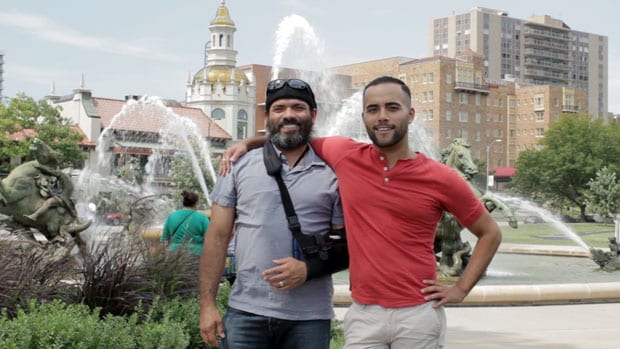Recognized by the White House as a ‘Champion of Change,” Marco Castro-Bojorquez shows Latino families in a different light

Santiago Vasquez Sr., left, and his son Santiago Vasquez Jr. are featured in Marco Castro-Bojorquez documentary on fathers and sons. (Photo courtesy Marco Castro-Bojorquez)
Chris Azzopardi | Contributing Writer
chrisazzopardi@pridesource.com
Marco Castro-Bojorquez was never very close to his father. They rarely spoke, especially about Castro-Bojorquez’s sexuality.
But two years ago, on New Year’s Eve, something changed.
His family went out that night, but not Castro-Bojorquez. He chose to stay home to spend time with his dad. He sipped a glass of white wine. His dad drank a cider. He remembers that the two “talked and talked” — something that didn’t happen very often.
The next day, Castro-Bojorquez recalls, his father spoke these simple yet treasured words: “I really enjoyed talking with you last night. We should do that again.”
Camilo Castro Casarez, died on May 15, 2015, just days before his son completed El Canto del Colibrí (The Hummingbird’s Song), his documentary telling the stories of Latino immigrant fathers who’ve transcended racial stereotypes by showing their unconditional love for their LGBT children. The film is a tribute to his father Camilo.
“He was always very proud of me and my accomplishments and my independence, but we never really talked about me being gay openly until the very last month of his life,” says Castro-Bojorquez, 48, noting that, together, they watched some of the unfinished film just before his death. “He was very interested in the film and we talked about it, and it’s kind of symbolic be-cause we had a great time.”
Before Marco Castro-Bojorquez’s documentary, two moms of Somos Familia, a San Francisco-based educational support program for moms and their LGBT kids, were in pursuit of culturally relevant programming that reflected being the mother of an LGBT child. They found nothing.
But then they attended an LGBT youth conference with which Castro-Bojorquez was involved. They met Castro-Bojorquez at an LGBT youth conference, and they all agreed: If there was no programming, it would have to be created.
Castro-Bojorquez and fellow filmmaker Jose Alfaro made the mothers’ vision a reality with Tres Gotas de Agua (Three Drops of Water), a short doc featuring three Latina immigrant mothers pledging love for their LGBT children. It premiered in 2011.
Then, Castro-Bojorquez says, people began asking: What about the dads? After all, Latino fathers, he states, are the ones historically generalized as being “macho, homophobic and transphobic by nature.”
But for Castro-Bojorquez, that is a “completely racist” assumption. “If you engage with people who are Latino, like the Latino immigrants in El Canto, you find out that, of course they go through the same process, and some of them are not very accepting. But I think they have the capacity to transform.”
Shedding light on a wide-range of issues, including immigration, faith and coming out, that transformation is poignantly captured in a series of emotional interviews with Latino fathers and their LGBT children. El Canto is both culturally specific and universally affecting, but beyond that, it’s a powerful tool to bring fathers closer to their LGBT kids, regardless of ethnic background.
Castro-Bojorquez’s creation is close to his heart. The documentary, he says, is a hopeful yarn championing positivity when so little of it seems to exist.
“We have been smacked in the media with anti-immigration sentiments,” he says, “and there’s a lot of stuff that we see or hear that is negative about us. I wanted to balance it out and provide something that they could feel proud of.”
He breaks off, reckoning that, “I think that’s why they cry… people cry in the film. And I did too.”
Coming out for change

Marco Castro-Bojorquez has been recognized by the White House as a Champion of Change. (Photo courtesy Liz Salinas)
Castro-Bojorquez was studying medicine at Universidad Autónoma de Nuevo León in Monter-rey, Mexico, in the late 1980s, when AIDS was wreaking havoc. And the gay stigma associated with the virus made him even more wary of coming out as a gay man. Still, he told his mother, who then told his father, that he was gay while he was enrolled in med school.
“Coming out in Mexico, at least for me, with the lack of information and education and support, was trouble,” says Castro-Bojorquez, who was born and raised on the Mexican Pacific coast but, for political reasons, moved to California. “It was very confusing because I didn’t have anybody helping me to understand what it meant to be gay or queer. I had a couple of books and magazines, but I didn’t know what it was like to come out.”
It’d be reasonable to assume that Castro-Bojorquez’s own coming-out journey was the catalyst for his educational and advocacy-related work as a community educator in Lambda Legal’s western regional office in Los Angeles, but he considers his actual muse to be his mother, a rural school teacher who died in 2000.
“Losing my mom prompted my work [with Lambda Legal],” he says. “To honor my mother’s spirit and her legacy are the main reasons why I started to work with LGBT youth and their families.”
Last November, the White House recognized Castro-Bojorquez as one of nine “Champions of Change” for being a staunch advocate of LGBT-related issues. It was the first time, he says, that he won an award since he competed in a singing competition during a Mother’s Day celebration when he was in elementary school. “I won a lollipop,” he laughs.
Leslie J. Gabel-Brett, director of education and public affairs at Lambda Legal, praised Castro-Bojorquez for having “made a beautiful film that is a powerful tool for increasing understanding of the experiences of Latino immigrant families with LGBTQ youth. It is such a well-deserved honor for him, and an amazing opportunity to raise up the voices and stories of these families.”
Castro-Bojorquez said he was flattered to get the recognition from the White House. But he is quick to note that his film represents the work of many.
“I’m very grateful and appreciative of people recognizing my work,” he says. “But it’s not only my work, it’s the work of a team of people that have helped me for many years. Not only the people who did the film with me, but my mentors, the youth that I work with, the families. All of those people influence the things that we end up creating.”
Chris Azzopardi is the editor of Q Syndicate, the international LGBT wire service. Reach him via his website, Chris-Azzopardi.com, and on Twitter (@chrisazzopardi).
This article appeared in the Dallas Voice print edition February 26, 2016.














